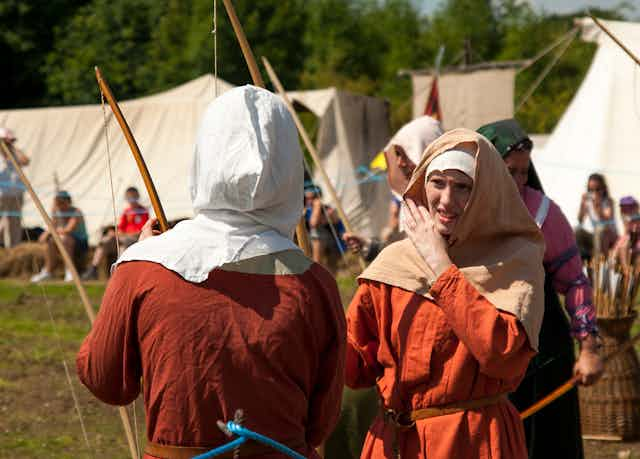Who was the first person to speak English? – Grace, aged eight, Belfast, Northern Ireland
The first speaker of English did not sound like you or me. That’s because language changes all the time. You have probably noticed that the language of your grandparents differs from yours. You can imagine then how very different English was when it was first spoken in Britain many centuries ago.
The earliest speakers of English spoke Old English. I am using the word “speakers” because there must have been more than one speaker: after all, we use language to talk to others.
Old English developed in a turbulent period of British history. This was just after the Romans had left Britain, around 1,600 years ago. The Romans had colonised Britain but they abandoned the country in the fifth century because the Roman empire was collapsing all around them.

Curious Kids is a series by The Conversation that gives children the chance to have their questions about the world answered by experts. If you have a question you’d like an expert to answer, send it to curiouskids@theconversation.com and make sure you include the asker’s first name, age and town or city. We won’t be able to answer every question, but we’ll do our very best.
The Romans who ruled Britain spoke their language, Latin. But most of the people who lived in Britain when the Romans were there – and before that too – spoke a Celtic language. This Celtic language was rather like Welsh, but again much older than the present-day Welsh language.
After the Romans left Britain, Germanic tribes who were on the move throughout Europe in the fifth and sixth centuries invaded. These tribes were the Angles, the Saxons and the Jutes. The language they spoke is known as North Sea Germanic.
The first English speakers
Once they settled in Britain it became Old English, which is also sometimes called “Anglo-Saxon”. From the Angles comes the word “English” and from the Angles and Saxons together comes the word “Anglo-Saxon”. I teach Old English to students of English at university.
So Old English or Anglo-Saxon is the oldest form of the English language that was spoken and written in England in the early Middle Ages, the period from roughly 450 to 1050. Very few Celtic words were taken over into Old English. The word “brock” (meaning “badger”) is one of the rare exceptions.
Do we know the names of the first speakers of Old English? Two names are mentioned in ancient legends that tell the story of how the Angles and the Saxons arrived in Britain.
According to these legends, the British (when they were still Celtic speakers) asked two Germanic leaders, Hengest and Horsa, to come to Britain to help protect the country after the Romans had left.
Hengest and Horsa arrived in Britain with lots of other people from their tribe and conquered the land. We have no way of knowing if these legends are true, but if they are we have here the names of the two chieftains who brought their language to Britain.
An Old English poet
There is one other name that deserves to be mentioned, and that is Caedmon. He is the first poet in English whose name is known. The story of his life is told by the monk and historian Bede, who lived in the north of England from around 673 to 735.

Bede not only tells the story of Hengest and Horsa, but he also tells us about Caedmon, who was a cowherd. Bede wrote that Caedmon could not read or write and received the ability to compose beautiful poetry as a gift from God. The first poem that Caedmon was inspired to create is a poem in praise of God. The first two lines of this poem will give you a taste of Old English:
Nu sculon herian heofonrices Weard,
Metodes mihte and his modgeþanc
In modern English, this means: “Now we must praise the guardian of the heavenly kingdom, the Ruler’s might and his plan”.
You might think this is not really English at all. But we still use some of the words used in Old English – “and” and “his” are both in these two lines of poetry. Other words have survived too, though we often spell and pronounce them differently. See if you can spot the Old English words for “might” and “now” in these lines from Caedmon’s poem.
Caedmon looked after the cattle in a monastery in Whitby in Yorkshire. One of my university students studying Old English comes from Whitby and she told me that her school is named after our first named English poet: Caedmon College. His legend lives on.


